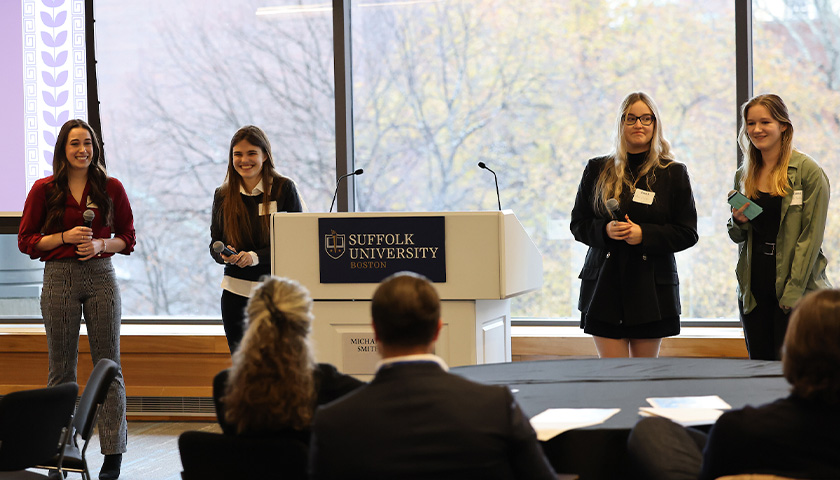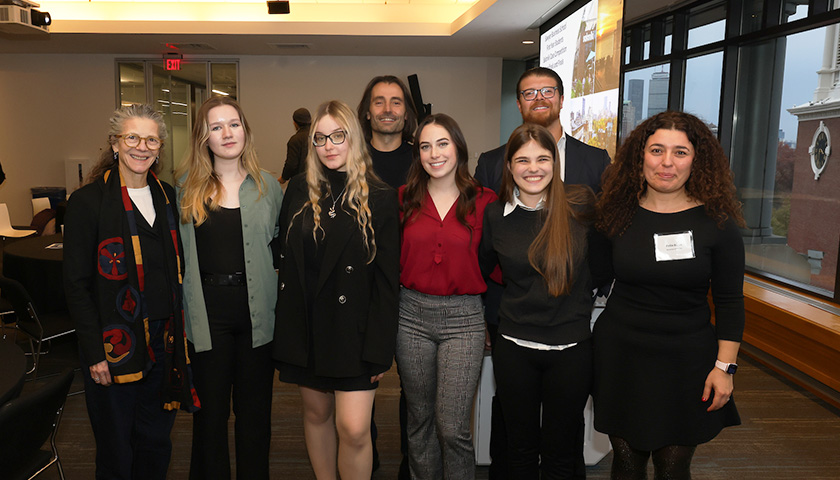
Saloniki, a flourishing fast-casual restaurant chain known for its fresh, Greek-inspired cuisine, is at a pivotal juncture. Competing with giants like Chipotle and Sweetgreen, Saloniki wants to increase its appeal to the elusive tastes of Generation Z. How can they do that?
That was the challenge that first-year students in the Sawyer Business School tackled in the Business Foundations course. Through the fall 2023 semester, 527 students on 110 different teams explored issues like how to balance human touch (warm hospitality) and technology (convenience). The course culminated in a day-long pitch competition that involved 22 teams presenting to 16 judges. The final four groups then presented to Saloniki’s co-founders: Suffolk alumnus and CEO Eric Papachristos, MBA ’99; COO Jon Mendez; and Saloniki Chef Jody Adams, a two-time James Beard Award winner and a veteran of the Boston culinary scene.
“The goal for the students was to help Saloniki figure out how to navigate the currents of tradition and modernity in what’s called fast-casual dining,” said Professor Pelin Bicen, associate dean of undergraduate programs and faculty coordinator for the course. “This kind of immersive consulting is exactly the sort of experience we want our students to get exposed to as much as possible. That’s why we made it a centerpiece of the first-year curriculum.”
Nothing artificial—except the intelligence
Students dove deep into the Saloniki experience, visiting their five Boston and Cambridge locations (including the one just down the street from the Suffolk campus), surveying other students about competitors, and tracking down data to support their recommendations.
Utilizing tools like Ansoff’s matrix to help analyze growth potential and PESTEL analysis to identify threats and weakness, the winning team of four presented a catalog of ideas to Saloniki’s leadership. Their suggestions included unifying the décor of the stores, suggesting where Saloniki might franchise next, and playing Greek music in the restaurants (instead of the merengue they heard during one visit). For increased name recognition, the team used artificial intelligence (AI) to create a mascot for the brand (see image).
To help answer the main question of how Saloniki can balance technology with a personal touch, the team proposed a menu powered by AI that helps make the ordering experience more robust. After a customer provides his or her preferences, AI not only would suggest dishes but also provide recommendations for personalized plating and garnishing. It would even weave in Greek mythology based on what a customer ordered.

“Our group came up with so many ideas,” said Anja Wight. “We have a document that's probably 20 pages long where we just put everything we thought of. We chose our strongest points and then took the time to organize it. Then we put a fun twist on the presentation itself.”
The judges liked what they saw and heard.
“We were really impressed by the hard work that all the teams did,” said CEO Papachristos. “We think about this stuff every day, and the ideas the students gave us were thoughtful and insightful.”
One reason the team thinks they won, according to Emma O’Neill, was that they brought an informed perspective to their ideas. “The thing that was different about our presentation compared to the other ones was that we made it apparent that we are Gen Z and we're telling Eric and his team, ‘This is us giving you our genuine input as Gen Z. This is who you're trying to talk to.’ So it helped to authenticate and be more personal with the crowd.”
After the competition, the winning group was invited to meet with Saloniki’s chief marketing officer and present their findings. “We are very excited to share our ideas with her,” said Julia Spalding. “Maybe they can integrate some of them.”
“It’s just crazy to think that our business project could turn into an actual thing that we could see in their restaurants,” said Anna Chistova.

Contact
Greg Gatlin
Office of Public Affairs
617-573-8428
Ben Hall
Office of Public Affairs
617-573-8092



